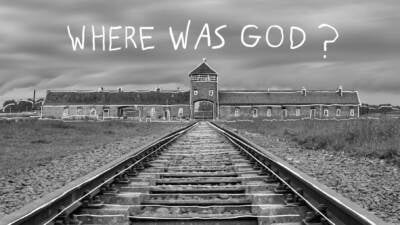How does the Holocaust impact interfaith relations today?
Interfaith Relations and the Holocaust (Topic 9)
Share
In April 2020, to coincide with Yom HaShoah, the day in the Jewish calendar dedicated to Holocaust remembrance, and the 75th anniversary of the liberation, Rabbi Sacks launched a series of videos offering his perspective on some of the biggest questions asked about the Holocaust.
One of the effects of the Holocaust has been to bring faiths much closer together. It’s been an extraordinary and transformative experience. Probably the most important moment happened in 1960, when a very fine Pope, Pope John XXIII met the French Jewish historian Jules Isaac, who had written the history of what he called de adversus judaeos literature, the antisemitic literature of the early church, of the church fathers. And the Pope, having read Jules Isaac’s work, took it profoundly to heart and met him in 1960 and almost certainly it was that that set in motion a what became known as Vatican II in 1965 and the declaration Nostra Aetate. Neither man actually lived to see that happen. John XIII died in 1963, and it was Paul VI who was actually Pope at the time, but that transformed the relations between Jews and the Catholic Church; having for 17 centuries or so, met as deeply estranged faiths, today they meet as friends.
And that of course has had a spillover effect among other faiths. In 2008, on the anniversary of Kristallnacht, or close to it, the Archbishop of Canterbury Rowan Williams and I took a group of representatives of all the major faiths in Britain, not just Christian but Muslim, Hindu, Sikh, Buddhist, Jain, Zoroastrian and Bahá’í to Auschwitz. I can’t remember a bonding experience like it. It was profoundly moving. Not only profoundly moving while we were there, but it was profoundly moving when we sat together in Krakow airport and talked through our feelings. So we became very, very bonded together. We’d been friends before, but this really transformed it and gave it greater depth. And I think that has to happen. It really has to happen. The truth is that we need to stand together because, as I’ve often said, Jews cannot fight antisemitism alone. The victim cannot cure the crime. The hated cannot cure the hate. We need other people to be there fighting that battle alongside us.
And the corollary is that we have to be there for other faiths when they face their difficulties, just as Christians have been facing in the Middle East and in parts of Africa today, and that’s a battle I tried to fight as hard as I could. We need to be there for one another. The Holocaust should be able to unite the world faiths around three fundamental principles.
Firstly, the dignity and sanctity of every human life as the image of God. Secondly, the covenant of human solidarity, which we call the covenant with Noah in Genesis, chapter nine, although it doesn’t matter what theological basis you give. The truth is we are all responsible for one another. The covenant of human solidarity. And then, thirdly, the most difficult but poignant remark of Martin Luther King, “in the end, we will remember not the words of our enemies, but the silence of our friends”. When our friends are in trouble, we must not be silent.
And therefore I think that in, human terms, possibly the worst crime of man against man in recorded history might just lead us to a meeting of minds and faiths and peoples that will ensure that such things never happen again.

This series, created in partnership with the Holocaust Educational Trust, has been made possible thanks to the generous support of Richard Harris.
More Holocaust Curriculum Resources

Faith After the Holocaust
Rabbi Sacks responds to the devastation of the Holocaust

Where can you find hope in the history of the Holocaust?
Hope and the Holocaust (Topic 10)

How do you connect the Holocaust with the establishment of the State of Israel?
Israel and the Holocaust (Topic 8)

Do you think it’s ever possible to forgive the perpetrators of the Holocaust?
Forgiveness and the Holocaust (Topic 6)

What is the difference between vengeance and justice?
Jewish Theology and the Holocaust (Topic 5, part 3)

What about a statute of limitations?
Just Punishment and the Holocaust (Topic 5, part 2)

A Just Punishment for the Nazis?
Just Punishment and the Holocaust (Topic 5, part 1)

Do you think the Holocaust represented a failure of humanity?
Humanity and the Holocaust (Topic 2, part 1)

Does God care about individual lives, or merely the survival of the Jewish people as a nation?
God and the Holocaust (Topic 1, part 3)

Do you have faith in humanity after the Holocaust?
God and the Holocaust (Topic 1, part 2)

Where was God during the Holocaust?
God and the Holocaust (Topic 1, part 1)

What is theologically unique about the Holocaust?
Jewish Identity and the Holocaust (Topic 7, part 3)

Practically speaking, is there something unique about the Holocaust?
Jewish Identity and the Holocaust (Topic 7, part 2)

Should a Jewish theological response to the Holocaust include issues of justice?
Jewish Theology and the Holocaust (Topic 3, part 2)

Should the Holocaust be a key ingredient of our Jewish identity?
Jewish Identity and the Holocaust (Topic 7, part 1)

How has the Holocaust impacted your personal relationship with God?
Personal Faith and the Holocaust (Topic 4)

What do you think the Jewish theological response to the Holocaust should be?
Jewish Theology and the Holocaust (Topic 3, part 1)

How can I have faith that God is within each of us if I mistrust humanity?
Humanity and the Holocaust (Topic 2, part 3)

Can we trust people other than ourselves?
Humanity and the Holocaust (Topic 2, part 2)
